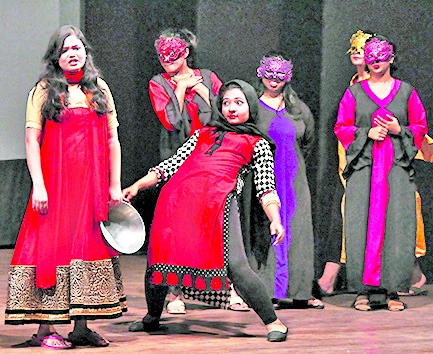
With JUDE, one can always expect something unlike the usual college capers. Take their latest production, Lysistrata, which was staged on March 3 at Gyan Manch. As the latest exercise in aesthetic appreciation for his students at Jadavpur University Department of English, Professor Ananda Lal took up the 2,400-year-old comedy by Aristophanes and drew a subtle line with the contemporary world.
Acknowledged as the first feminist play, Lysistrata is quite popular in the international college circuit. One wonders how many colleges in India would feel comfortable with the acerbic and raunchy dialogues but JUDE's facebook page cheerfully invited people to this play "with coitus related puns and phallus jokes galore!"
But anyone who went to see Lysistrata to be tickled by explicit dialogues (we get plenty of those in the public media) must have received a jolt by the projected slides of ISIS destroying the Palmyra monuments. When the women actors entered, they wore head scarves giving the play a new context.
Aristophanes's play is about an exceptional young woman of Athens, Lysistrata, who comes up with a novel plan to stop the long drawn and devastating Peloponnesian War. Lysistrata exhorts the women of Athens and Sparta to repulse the sexual advances of husbands and lovers so as to force them to sign a truce.
Can a sex strike really halt war? It must have seemed as ridiculous then as now. But in looking candidly at one basic factor of life, the play strips both actors and audiences of niceties and forces them to recognize the undeniable universality of the thirst for love and understanding. The role of women as homemakers and caregivers who can straighten out socio-political tangles is highlighted. Women are willing to forget trivial differences for the sake of success. With the help of the old women of Athens, Lysistrata manages to take control of the Acropolis, which has the treasuries and now gives shelter to the striking women.
The JUDE rendition underlines the crisis, the need for men and women across enemy lines to come together, as one reason why Reconciliation (a beautiful nude in the original text) turns up in a costume that represents the globe.
The young actors, who themselves voted for this text, were bubbling with enthusiasm. Rai Debnath as Lysistrata, Sananda Gopalakrishnan as Lampito, Sayon Banerjee as Cinesias, Adrija Ghosh as Myrrhine and nearly every member of the old men and old women choruses added their bit to the enjoyment.
But what made this production really special was the music: live and original songs with live and original score and music. Sourjyo Sinha strummed the guitar while Shireen Ghosh played the Bouzouki.











